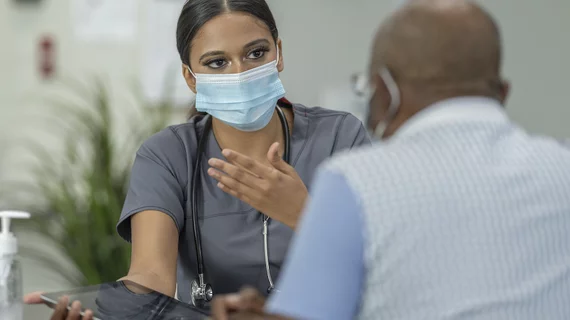Should masks still be required at hospitals? Physicians push for a nuanced approach in face of uncertainty
With COVID-19 cases slowly climbing, debates are sprouting up left and right about whether or not it makes sense to return to regular masking in some public areas. A team of physicians examined the issue from their own perspective, urging healthcare leaders to work together in a new commentary in Annals of Internal Medicine.[1]
The authors emphasized the necessity of considering the long-term impact of COVID-19, especially in high-risk populations. Even with declining rates of severe cases due to increased community immunity and medical countermeasures, severe outcomes related to COVID-19 still persist, particularly among older individuals and those with underlying health conditions.
Further, the potential long-term effects of COVID-19 infections are only beginning to be understood, which the authors said signals need to continue certain safety measures.
“The ongoing disease burden among persons at highest risk for severe COVID-19, the large proportion of transmission from asymptomatic and presymptomatic cases, uncertainty about the future course of the pandemic, and the effects of post–COVID-19 conditions merit integration of lessons learned from the pandemic into healthcare precautions and policies,” wrote first author Eric J. Chow, MD, MS, MPH, a specialist with the division of allergy and infectious diseases at the University of Washington, and colleagues.
Almost all pandemic emergency declarations have been lifted worldwide, and most people in the general community have returned to pre-pandemic behaviors. This has all occurred, the group noted, despite the ongoing circulation of COVID-19.
While Chow et al. offer little judgment over this, they do highlight the risks to vulnerable populations at high-risk for negative effects of the disease, emphasizing that masking also plays a crucial role in protecting healthcare workforce.
“It is likely that before the pandemic, we vastly underappreciated the degree of harm caused by hospital-acquired respiratory viral infections that were preventable by masking among patients and healthcare workers,” the authors wrote.
Recent research has suggested that the asymptomatic, presymptomatic, and pauci-symptomatic spread of COVID-19 was much more common than experts may have originally believed. This is one example of a lesson learned during the pandemic that could be used to shape updated policies related to masking.
Addressing concerns about communication and logistical challenges associated with mask wearing, the authors advocated for shared decision-making that considers both patient-provider dynamics and overall health risks. They proposed various approaches to incorporating masking into healthcare policies, ranging from year-round implementation to targeted settings based on patient risk profiles.
The authors also encouraged healthcare facilities to tailor their masking policies based on regional variations in community viral burden while prioritizing patient safety. An example of what this would look like is what occurred at Washington State, where regional healthcare organizations have adopted a collaborative approach to masking, recognizing the importance of adapting policies to the evolving endemic of all respiratory viruses.
"We should be mindful of continuing areas of uncertainty while integrating the lessons learned into our hospital-based practices to prevent harm to vulnerable patients rather than reverting to suboptimal prepandemic behaviors,” the authors concluded.
Read the full commentary here.

